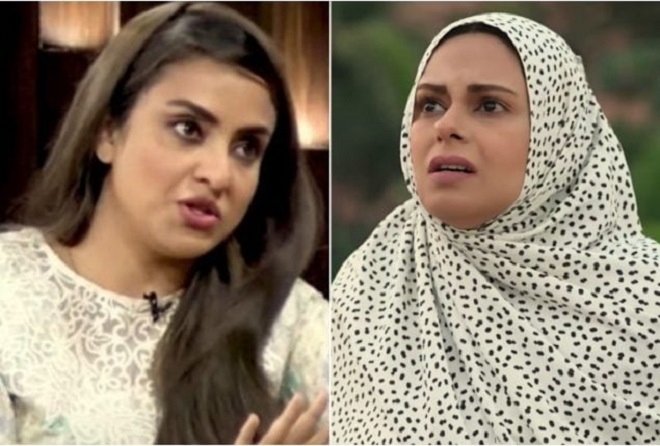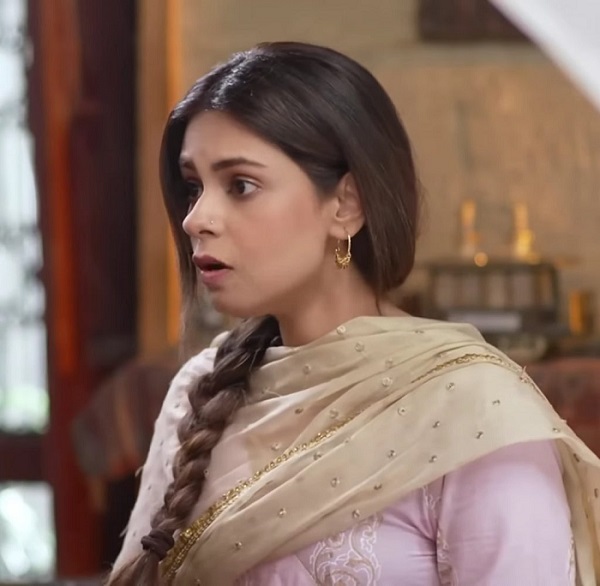
In the world of Pakistani drama, Dil e Nadan has quickly become one of the most talked-about shows on television. The drama, which delves into the complexities of human emotions, relationships, and societal pressures, has captivated audiences with its intense storyline and compelling performances. Among the standout moments in the series, one scene in particular has sparked significant attention—Nadia Khan’s ridicule of Amar Khan’s innocent act.
Setting the Stage: Dil e Nadan and Its Impact
Dil e Nadan is a story that revolves around the lives of its central characters, each dealing with their own struggles and inner turmoil. Amar Khan plays a pivotal role in the series, portraying a character that embodies innocence, naivety, and a heart full of goodness. Her portrayal has resonated with many viewers, as they see in her character a reflection of purity and sincerity that is often lacking in the harsh realities of life.
Nadia Khan, a seasoned actress known for her dynamic roles, plays a more complex and layered character in the drama. Her role is that of a strong, opinionated woman who has little patience for what she perceives as weakness or foolishness in others. This stark contrast between the two characters sets the stage for the confrontation that has become a focal point of discussion among fans.
The Scene: An Innocent Act Misunderstood
In one of the recent episodes, Amar Khan’s character performs a seemingly innocent act, rooted in her character’s inherent kindness and trust in others. The act, which she intended as a gesture of goodwill, is seen by Nadia Khan’s character as naive and foolish. This moment becomes the turning point for a heated exchange between the two characters, where Nadia Khan’s character ridicules and harshly criticizes Amar Khan for her actions.
The scene is powerful not just because of the dialogue, but because it highlights a fundamental clash in worldviews. Amar Khan’s character believes in the goodness of people and the power of simple, kind gestures. In contrast, Nadia Khan’s character represents a more cynical perspective, where such innocence is seen as a weakness that can be exploited in a world that is anything but kind.

Nadia Khan’s Portrayal: The Voice of Harsh Reality
Nadia Khan’s performance in this scene has been nothing short of brilliant. Her ability to convey disdain and ridicule while maintaining the complexity of her character’s motivations has earned her praise from critics and audiences alike. She portrays a woman who has perhaps seen too much of the world’s harshness and has developed a tough exterior as a defense mechanism. Her ridicule of Amar Khan’s character is not just a moment of belittling, but a reflection of her own internal struggles and the scars left by a world that has often been unkind to her.
In many ways, Nadia Khan’s character is a voice of harsh reality—a reality that many viewers can relate to. Her ridicule is not just about the act itself but about the underlying belief that innocence and goodness are vulnerabilities that can lead to one’s downfall. It is a perspective shaped by experience, where survival often means hardening one’s heart and not allowing oneself to be too trusting or too kind.
Amar Khan’s Response: The Strength of Innocence
Amar Khan’s portrayal of her character’s response to Nadia Khan’s ridicule is equally compelling. Instead of responding with anger or bitterness, her character remains true to her values, standing firm in her belief that kindness and innocence are not weaknesses but strengths. This response adds depth to her character, showing that her innocence is not born out of ignorance, but from a conscious choice to see the good in others and to act in a way that aligns with her moral compass.
This dynamic creates a powerful narrative tension in the drama. It raises important questions about the nature of strength and weakness, and whether it is better to be guarded and cynical, or to maintain one’s integrity and kindness even in the face of ridicule.
The Broader Implications: Society’s Perception of Innocence
The confrontation between Nadia Khan and Amar Khan’s characters in Dil e Nadan speaks to a broader societal issue—the way innocence and kindness are often perceived as weaknesses in a world that values power, control, and survival of the fittest. This perception is not limited to the fictional world of the drama but is a reflection of real-world attitudes that many people face in their daily lives.
In many cultures, including in Pakistan, there is a strong emphasis on toughness and resilience. People are often taught that in order to succeed, they must be wary of others, protect their interests, and not allow themselves to be taken advantage of. In such a context, those who are kind-hearted or who operate from a place of trust and innocence are often seen as vulnerable or even foolish.
Nadia Khan’s character embodies this societal belief, where her ridicule of Amar Khan’s character is a manifestation of a worldview that sees kindness as a liability. However, the drama challenges this perspective by showing the strength that can come from maintaining one’s values in the face of adversity.

Audience Reactions: A Divided Opinion
The scene has sparked a wide range of reactions from viewers, many of whom have taken to social media to express their thoughts. Some viewers side with Nadia Khan’s character, arguing that her harshness is justified given the realities of the world. They believe that Amar Khan’s character needs to “wake up” and recognize that her innocence could lead to her being hurt or taken advantage of.
On the other hand, there are many viewers who sympathize with Amar Khan’s character and appreciate her unwavering commitment to kindness and trust. They argue that it is precisely these qualities that make her strong and that the world needs more people like her who are willing to believe in the goodness of others.
This divide in audience opinion highlights the complexity of the issue at hand. It is not a simple matter of right or wrong, but rather a reflection of differing worldviews and life experiences. The drama does an excellent job of presenting both perspectives, allowing viewers to engage with the narrative on a deeper level and to reflect on their own beliefs and values.
The Power of Drama: Sparking Important Conversations
Dil e Nadan has shown the power of drama to spark important conversations about societal norms, values, and the nature of human interactions. The scene between Nadia Khan and Amar Khan is a perfect example of how a well-crafted narrative can resonate with audiences and provoke thought.
In many ways, this confrontation is not just about the characters on screen, but about the viewers themselves. It challenges us to consider how we view innocence and kindness, and whether we are too quick to dismiss these qualities as weaknesses in a world that often prizes the opposite.
Conclusion: A Moment of Reflection
As Dil e Nadan continues to unfold, it will be interesting to see how the relationship between Nadia Khan and Amar Khan’s characters develops. Will Nadia Khan’s character soften and come to appreciate the strength in Amar Khan’s innocence? Or will Amar Khan’s character be forced to toughen up in order to survive in a harsh world?
Whatever the outcome, this scene has already left a lasting impact on the audience, prompting viewers to reflect on their own views about innocence, kindness, and the realities of life. It is a testament to the power of drama to not only entertain but also to engage and challenge us in meaningful ways. As the story continues, fans will no doubt be eager to see how these themes are further explored in the episodes to come.

